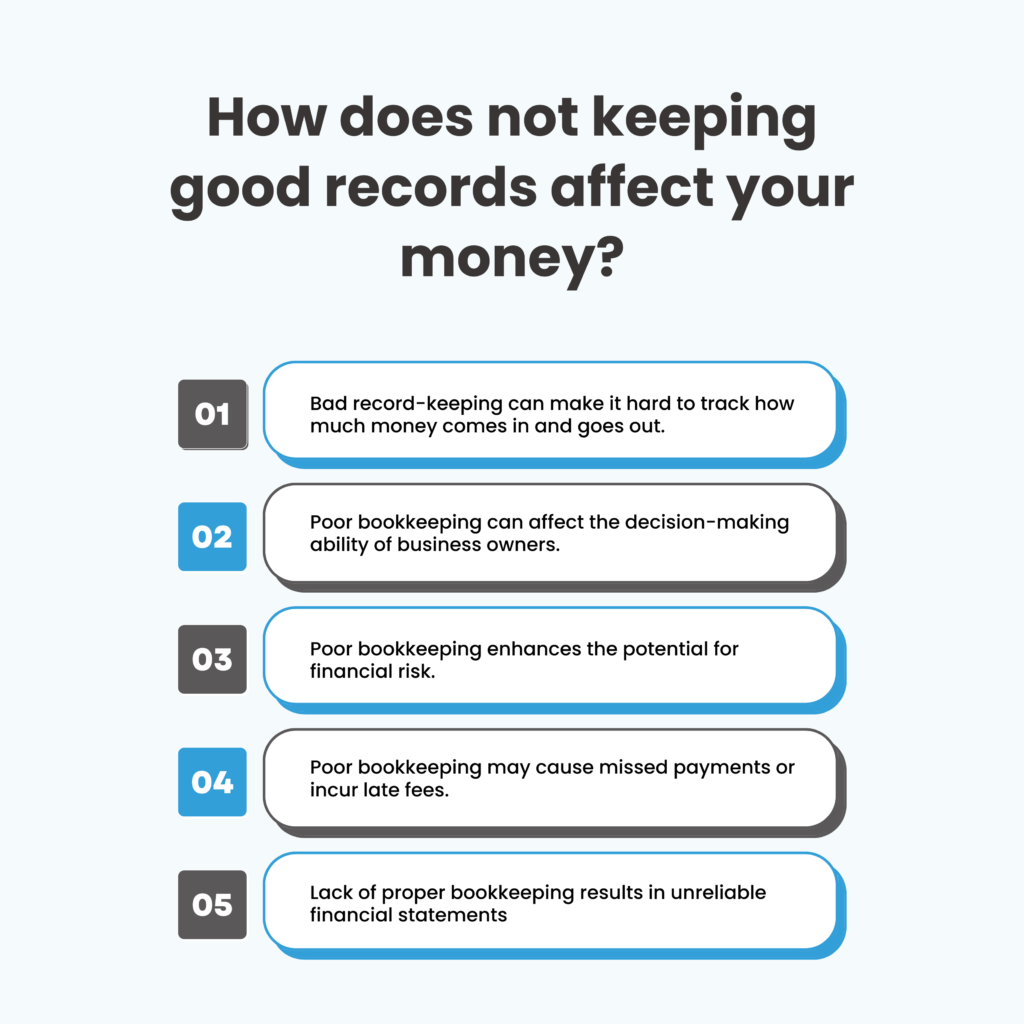
Are you tired of constantly making the same mistakes when it comes to managing your finances? Do you dread tax season because of disorganized books? Look no further; we have got your back. As a small business owner, we understand you have a lot on your plate. Between running your day-to-day operations and growing your business, it can be easy to let some things slide. But one thing you cannot afford to neglect is bookkeeping. Maintaining accurate financial records is crucial to the success of any business. Good bookkeeping can help you make informed decisions about where to allocate your resources, track your progress, and measure your success. So, in this blog, we have outlined 7 common bookkeeping mistakes that businesses generally make, highlighted tips on how to avoid them, and explained how outsourced bookkeeping services can be. So, let us begin to say goodbye to financial stress and hello to accurate records!
Bookkeeping might not be the most glamorous aspect of running a business, but it's undeniably crucial. Accurate financial records are the backbone of your business's health. Unfortunately, many business owners make common bookkeeping mistakes that can significantly impact on their bottom line.
A common mistake in bookkeeping is mixing business and personal expenses. When you do this, it's hard to know how well your business is doing financially. This can cause problems when you file taxes or apply for loans later. To avoid this, use separate bank accounts for your business and personal money. Also, keep separate credit cards for business expenses and personal expenses. This helps you keep track of what money is going where and makes things clearer when you need to look back at your finances.
Forgetting to keep track of receipts and payments is another big bookkeeping mistake. This can cause your financial records to be wrong and might even lead to legal trouble if your business gets audited. To avoid this problem, make sure you carefully record every dollar that comes into and goes out of your business. You can do this by using a trusted outsourced bookkeeping service or by managing it yourself. Keeping good track of your receipts and payments helps you stay organized and prepared, especially if you ever need to show your finances to someone else.
Using accounting software for your business can save you time and money, but it's crucial to use it correctly. If you don't use the software properly, it can lead to mistakes in your financial records, which might end up costing you money later. The software works well when you input accurate information about your income and expenses. To get the most benefit from your software, consider hiring an outsourced accounting team. These professionals are experts in various accounting software and can help ensure that your bookkeeping is accurate and efficient, which is essential for managing your business finances effectively.
Forgetting to match your bank statements with your records can cause discrepancies. It's important to regularly check and match them, especially if your business handles lots of transactions. This ensures your records are correct and up-to-date.
Also, not recording accruals can lead to mistakes in your financial reports. Accruals are expenses or income that happened but weren't paid or recorded yet. For instance, if you pay an expense in one month but it's for something that happened in another month, that's an accrual.
To avoid these errors, consider hiring experts who can carefully reconcile your accounts and keep track of accruals. If you're looking for reliable bookkeeping services, consider those available in India, where you can find skilled professionals at reasonable prices.
Check out our new blog - Need Help with Historical Bookkeeping? Follow These Steps!
Forgetting to pay your bills on time is a bookkeeping mistake you should steer clear of. This can result in extra fees, penalties, and interest charges. To avoid this, keep a record of when your bills are due and make sure to pay them on schedule. Setting up automatic payments can also help ensure you never miss a deadline, which is handy if you have many bills to handle each month. If keeping track of bills is challenging, think about hiring outside help like accounting and bookkeeping services. They can assist in keeping your finances organized and ensuring bills are paid promptly.
Bookkeeping is crucial and should be done correctly. Doing it yourself might give you the wrong financial picture of your business, leading to expensive mistakes later. Hiring outsourced bookkeeping and accounting services gives you access to experts who can keep things organized and catch errors early. Besides bookkeeping, you can also consider outsourcing services for handling payments you owe, money owed to you, and payroll. It's best to avoid trying to save money by doing your own bookkeeping because the risks are too high, and mistakes could end up costing you a lot.
Forgetting to save enough money to cover taxes is a critical mistake to avoid. This oversight can cause significant financial issues later, making it challenging to catch up. When you're just beginning, it's common to underestimate your tax obligations. However, as your business expands, your tax liabilities are likely to grow too. That's why it's crucial to start setting aside funds for taxes right from the start.

Bookkeeping mistakes can seriously hurt your business financially. When your records aren't accurate, your financial statements won't show the true picture of your business's money situation. This can lead to decisions based on wrong information, causing problems over time.
Accurate bookkeeping is vital for smart financial choices in budgeting, cash flow planning, and assessing profits. Mistakes can make you think you have more or less money than you do, leading to overspending or missed chances.
If you suspect errors in your records, fix them fast. Hiring professional accountants and bookkeepers is wise—they can spot mistakes, keep your records current, and ensure accuracy. Outsourcing to trusted providers means your finances are managed by skilled experts in accounting.
Investing in outsourced accounting gives you peace of mind and lets you focus on your business, ensuring better financial management for long-term success and stability.
Outsourcing bookkeeping and other financial tasks can be a game-changer for your business. It helps you steer clear of common mistakes that often occur when managing finances in-house. By outsourcing, you free up valuable time to focus on other critical aspects of your business, while experts handle your financial management using cutting-edge software and practices. This approach not only enhances accuracy but also cuts costs, eliminating the need for expensive software or a full-time bookkeeper.
Moreover, outsourcing offers flexibility tailored to your business needs. You can choose services like accounts receivable, accounts payable, and payroll outsourcing to streamline every aspect of your accounting operations. With your finances in capable hands, you can have peace of mind and confidently concentrate on growing your business.
Bookkeeping mistakes can hurt your business by wasting your time and money. To avoid these errors and protect your profits, it's important to stay organized and understand the basics of bookkeeping. Establish reliable systems to accurately track expenses, sales, payments, and other financial details.
Consider investing in a skilled accounting and bookkeeping team to ensure excellent results. At BookkeeperLive, we specialize in providing accounting and bookkeeping services across various industries. Our experts have deep knowledge of accounting and extensive experience with different software. Contact us today to discover how our solutions can elevate your business!
1. How can bookkeeping mistakes affect my business?
Bookkeeping errors can lead to inaccurate financial statements, missed tax deductions, cash flow problems, and legal issues.
2. How often should I review my financial records?
It's recommended to review your financial records at least monthly, but quarterly reviews are also beneficial.
3. What should I do if I discover a bookkeeping error?
Correct the error immediately, document the changes, and notify relevant parties like accountants or tax professionals.
4. Should I outsource my bookkeeping?
Outsourcing can save time and reduce errors, but it's essential to choose a reputable bookkeeping service.
5. How does bookkeeping support business growth?
Accurate financial data helps make informed decisions about expansion, investment, and resource allocation.
BookkeeperLive provides affordable bookkeeping and accounting services tailored to your business goals.





No calls, No meetings, No spam. Get started with a free trial by filling out the form.
*NDA included for your data protection.
Copyright © 2025 BookkeeperLive. All rights reserved. Privacy Policy Terms of Use
Please visit our India site to see services designed for your country
Enter the code, fill out the form, and unlock financial clarity with a free trial.